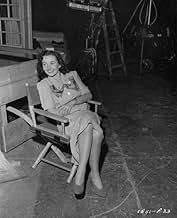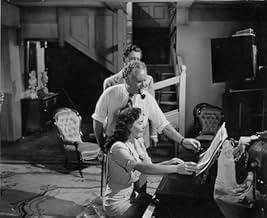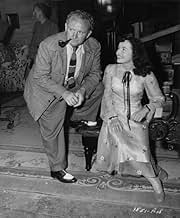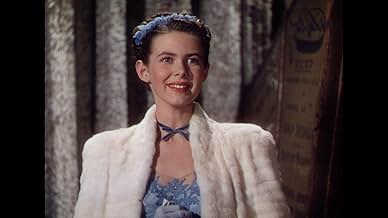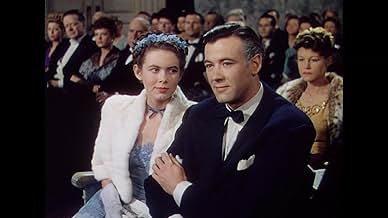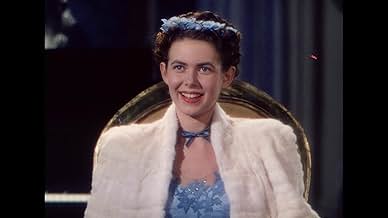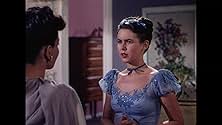NOTE IMDb
6,4/10
392
MA NOTE
Une pianiste promise à une grande carrière, décide de tout abandonner quand elle se rend compte que sa réussite risque de mettre en péril celui de son professeur dont elle est amoureuse. Ell... Tout lireUne pianiste promise à une grande carrière, décide de tout abandonner quand elle se rend compte que sa réussite risque de mettre en péril celui de son professeur dont elle est amoureuse. Elle part et épouse un fermier dont elle aura une fille.Une pianiste promise à une grande carrière, décide de tout abandonner quand elle se rend compte que sa réussite risque de mettre en péril celui de son professeur dont elle est amoureuse. Elle part et épouse un fermier dont elle aura une fille.
- Récompenses
- 2 victoires au total
Bill Carter
- George Sampter
- (as William Carter)
Maria Ouspenskaya
- Madame Goronoff
- (as Mme. Maria Ouspenskaya)
Lillian Bronson
- Music Teacher
- (non crédité)
Edgar Caldwell
- Call Boy
- (non crédité)
Paulina Carter
- 12 Year Old Girl
- (non crédité)
Maurice Cass
- Music Teacher
- (non crédité)
Charles Coleman
- Butler
- (non crédité)
Avis à la une
It's a very good story, like an interesting experiment in musical psychology, delving into and trying to reach the very essence and nature of the extreme sensitivity of the musical sense, but the acting is a bit stiff, and the story, although tremendously good and interesting, doesn't quite come alive. Catherine McLeod saves the picture, her acting is wholly satisfactory and convincing all the way, but the others are at times a bit too wooden. Philip Dorn is more abominable than not as the utterly rude and indecent conductor who thinks he can go at any length in insulting Catherine in the name of music, and no wonder she abandons music on conditions like that. There are many details in this artificial set-up that just don't work, they are neither credible nor natural, but there is nothing wrong with the idea. Although Frank Borzage made several films of music, and they are all good, it's over-evident that he was no musician himself.
On the whole, forget the flaws in the acting, the direction and the lack of musical realism but please follow and study the idea and the story, because the thoughts behind all this were humanly and psychologivally very interesting indeed.
On the whole, forget the flaws in the acting, the direction and the lack of musical realism but please follow and study the idea and the story, because the thoughts behind all this were humanly and psychologivally very interesting indeed.
"I've Always Loved You" is a 1946 production from Republic Pictures directed by Frank Borzage from a script by Borden Chase based on a magazine short story he'd published called "Concerto." In the mid-1940's, as World War II was winding down, Republic Pictures founder Herbert Yates, like other Hollywood studio owners, saw that the "B" picture was doomed and decided to push his company towards major-studio status by hiring important talents behind the camera: Ben Hecht for "Voice in the Wind," Orson Welles for "Macbeth" and Borzage under a long-term contract under which Yates would bankroll him in the sorts of big, romantic tear-jerkers that had been Borzage's specialty since his star-making film, "Seventh Heaven," in 1927. Oddly, the first film Borzage wanted to make at Republic was a John Wayne Western called Dakota, but Yates took that film away from both Borzage and Wayne and sent the script down his "B" Western assembly line instead. Borzage ended up hooking up with writer Chase, who came up with a tale that served as an excuse for Borzage to put a lot of great classical music on the screen, most of it played by pianist Artur Rubinstein (there are a few bits by a Republic studio orchestra as well), as well as staging the familiar romantic situations for which Borzage was famous.
The film opens in Philadelphia, where the world-renowned pianist and conductor Leopold Goronoff (Philip Dorn, an actor Warner Bros. had signed and tried to build into a sort of bionic combination of Paul Lukas and Claude Rains) is holding open auditions for a one-year scholarship for piano students. Goronoff's old friend Frederick Hassman (Felix Bressart), himself a formerly great concert pianist until he married an American woman and settled down in the farm town from which she had come, retiring from music and ultimately ruining his hands with farm work, shows up at the audition with his daughter Myra (Catherine McLeod). For all the money Herbert Yates threw at this movie, including paying for three-strip Technicolor and getting "name" talents behind the camera, he didn't go for star actors in the cast, and I got the impression Borzage had cast McLeod less for any acting ability than that she was a good enough pianist herself she could synchronize on screen with Rubinstein's playing and we could actually see her fingers striking piano keys instead of those awful shots with the body of the piano interposed between the camera and her hands. Goronoff thinks Myra is so good a pianist he offers to take her under his wing and let her move in with him - though since this is a 1946 movie, he does not insist that she become his mistress as part of the deal the way Lowell Sherman did with Madge Evans in a similar situation in the 1932 film "The Greeks Had a Word for Them," a.k.a. "Three Broadway Girls." Indeed, Myra's virtue is in no danger because she's protected not only by the Production Code but the formidable chaperoning of Goronoff's mother, played by Maria Ouspenskaya, billed with the honorific "Madame" in front of her name and easily taking the acting honors in this film. She makes a concert debut but the experience is so traumatic that she goes back to daddy's farm and accepts the marriage proposal of George Sampter (William Carter, a rather gangly but still nice-looking man whom we first get to see wearing jeans below the waist and nothing above it), and a couple of jump-cuts later Myra and George have a 17-year-old daughter who has dreams of piano stardom herself.
"I've Always Loved You" is a beautiful film when the characters are shown actually making music, but it's annoyingly sexist when they aren't; not only does Goronoff make a couple of blatantly anti-woman speeches to the effect that music is a man's world and women don't belong in it (ironic since at the time the film was made one of the world's top classical pianists was not only a woman but had the same first name as this film's heroine and a similar last name, too: Dame Myra Hess), but the whole story is framed as a contrast between Myra's pursuit of a musical career and her desire for a "normal" life as a wife and mother. Quite a few 1930's and 1940's movies set up that dichotomy for women seeking careers in singing, playing or dancing, and one of the few that didn't resolve its plot in that sexist fashion was a quite remarkable film from Republic's first decade as a studio, "Follow Your Heart," in which former Metropolitan Opera soprano Marion Talley played a woman who's encouraged at the end to "follow your heart" and go for the big operatic career rather than marry the small-town boyfriend and give up her dreams of stardom. Mostly, though, we got endings like the sexist cop-out of the otherwise magnificent film "Maytime" (1937), the best of the eight Jeanette MacDonald-Nelson Eddy movies, in which the aging diva Marcia Mornay (MacDonald) tells the young aspiring opera singer that the career isn't worth the heartbreak it entails and she should stay home and marry her boring boyfriend instead. In "The Red Shoes" (1948) the dilemma literally tears the central character, aspiring ballerina Moira Shearer, apart: torn between the choreographer who says she has to renounce love for her career and the composer who wants to write for her and also to marry her, she runs away after her performance and gets killed when she falls off a trestle into the path of an oncoming train: another annoying sexist cop-out ending to what's otherwise a great film. "I've Always Loved You" is hardly in the league of "Maytime" or "The Red Shoes" as a movie, but it shares with them this annoying streak of sexism that makes it a trial to sit through.
The film opens in Philadelphia, where the world-renowned pianist and conductor Leopold Goronoff (Philip Dorn, an actor Warner Bros. had signed and tried to build into a sort of bionic combination of Paul Lukas and Claude Rains) is holding open auditions for a one-year scholarship for piano students. Goronoff's old friend Frederick Hassman (Felix Bressart), himself a formerly great concert pianist until he married an American woman and settled down in the farm town from which she had come, retiring from music and ultimately ruining his hands with farm work, shows up at the audition with his daughter Myra (Catherine McLeod). For all the money Herbert Yates threw at this movie, including paying for three-strip Technicolor and getting "name" talents behind the camera, he didn't go for star actors in the cast, and I got the impression Borzage had cast McLeod less for any acting ability than that she was a good enough pianist herself she could synchronize on screen with Rubinstein's playing and we could actually see her fingers striking piano keys instead of those awful shots with the body of the piano interposed between the camera and her hands. Goronoff thinks Myra is so good a pianist he offers to take her under his wing and let her move in with him - though since this is a 1946 movie, he does not insist that she become his mistress as part of the deal the way Lowell Sherman did with Madge Evans in a similar situation in the 1932 film "The Greeks Had a Word for Them," a.k.a. "Three Broadway Girls." Indeed, Myra's virtue is in no danger because she's protected not only by the Production Code but the formidable chaperoning of Goronoff's mother, played by Maria Ouspenskaya, billed with the honorific "Madame" in front of her name and easily taking the acting honors in this film. She makes a concert debut but the experience is so traumatic that she goes back to daddy's farm and accepts the marriage proposal of George Sampter (William Carter, a rather gangly but still nice-looking man whom we first get to see wearing jeans below the waist and nothing above it), and a couple of jump-cuts later Myra and George have a 17-year-old daughter who has dreams of piano stardom herself.
"I've Always Loved You" is a beautiful film when the characters are shown actually making music, but it's annoyingly sexist when they aren't; not only does Goronoff make a couple of blatantly anti-woman speeches to the effect that music is a man's world and women don't belong in it (ironic since at the time the film was made one of the world's top classical pianists was not only a woman but had the same first name as this film's heroine and a similar last name, too: Dame Myra Hess), but the whole story is framed as a contrast between Myra's pursuit of a musical career and her desire for a "normal" life as a wife and mother. Quite a few 1930's and 1940's movies set up that dichotomy for women seeking careers in singing, playing or dancing, and one of the few that didn't resolve its plot in that sexist fashion was a quite remarkable film from Republic's first decade as a studio, "Follow Your Heart," in which former Metropolitan Opera soprano Marion Talley played a woman who's encouraged at the end to "follow your heart" and go for the big operatic career rather than marry the small-town boyfriend and give up her dreams of stardom. Mostly, though, we got endings like the sexist cop-out of the otherwise magnificent film "Maytime" (1937), the best of the eight Jeanette MacDonald-Nelson Eddy movies, in which the aging diva Marcia Mornay (MacDonald) tells the young aspiring opera singer that the career isn't worth the heartbreak it entails and she should stay home and marry her boring boyfriend instead. In "The Red Shoes" (1948) the dilemma literally tears the central character, aspiring ballerina Moira Shearer, apart: torn between the choreographer who says she has to renounce love for her career and the composer who wants to write for her and also to marry her, she runs away after her performance and gets killed when she falls off a trestle into the path of an oncoming train: another annoying sexist cop-out ending to what's otherwise a great film. "I've Always Loved You" is hardly in the league of "Maytime" or "The Red Shoes" as a movie, but it shares with them this annoying streak of sexism that makes it a trial to sit through.
This is director/producer Frank Borzage's most lavishly opulent sound film. It's a curio of a time long since past, when romanticism was celebrated and even the most wildly unrealistic moments seemed perfectly natural within their filmic contexts. Myra (the luminous and talented Catherine McLeod) is an aspiring concert pianist who comes to study under the imperious maestro Goronov (Philip Dorn), who was an admirer of her father (Felix Bressart) many years ago when the father was a professional pianist in Europe. But the father has since retired to rural America after meeting Myra's mother and forsaking his career for her 20 years earlier. (The mother has since died, and Myra's "maternal guidance" in the film is provided by the dimunitive powerhouse Maria Ouspenskaya, here playing Goronoff's mother and "the woman behind the great man.") As Myra is molded by Goronoff (who doesn't hold women in any high regard at all and goes through them like he would pairs of underwear, but who does respect talent) into a superior pianist, Myra falls in love with her Svengali. But Goronoff refuses to admit how much Myra has come to mean to him, and when her father dies, the grief-stricken Myra must choose between the man she has loved unrequitedly and a local farmer, George (Bill Carter) who has loved her all her life. Which one will she choose?
This is a classic woman's-film dilemma, and the characters in it are more mythical "types" than the flesh-and-blood, warts-and-all characters we would expect to see today. But that's not a problem for Borzage, whose intensly romantic, lushly envisioned films have always put love on the highest pedestal. What brings this film truly to life is the nuanced, deeply felt performances by all involved. Even the seemingly serene, uncomplicated George comes to life when declaring his hidden love for Myra. No matter how surreal the story may seem (especially if you're not used to seeing and enjoying classic cinema melodramas), the actors' and the director's commitment to it is absolute, giving the film an interior life and intensity that have made it a cult favorite and guilty pleasure, especially for Borzage fans. The classic Borzage theme: that metaphysical love can (and should) conquer all is ever present, as are the typical Borzagian dichotomies (e.g., between artist and simple country folk, passionate love and companionate love, men and women, and country versus city, etc.)
Borzage had just signed a multipicture deal with the fledgling Republic studios in 1945 when production began, and it's clear the studio spared no expense with their Academy-Award winning director. Lavishly photographed in Technicolor with colossal classical sets, exquisite costumes, and extensive piano doubling by Artur Rubinstein, I'VE ALWAYS LOVED YOU will definitely appeal to classical music lovers familiar with the backbiting world of professional music. All others need to watch not only with an open mind, but with an open heart.
Despite the somewhat contrived ending, I'VE ALWAYS LOVED YOU is worth seeing as one of Borzage's peniultimate films, and one he was able to make his most lushly romantic. To this day, few directors can boast such an incredible command of both the visual and emotional elements of almost every film (with the possible exception of Douglas Sirk). As Rainer Fassbinder once said of Douglas Sirk, you can tell from his films that he (Sirk) "really loves people, and doesn't depise them, as we do." The same could be said of Borzage--one of the cinema's first, last, and greatest romantics.
Kudos also go to the UCLA Archives for a superb Technicolor restoration. This VHS is definitely the version to watch. Beware of old black and white TV prints..
This is a classic woman's-film dilemma, and the characters in it are more mythical "types" than the flesh-and-blood, warts-and-all characters we would expect to see today. But that's not a problem for Borzage, whose intensly romantic, lushly envisioned films have always put love on the highest pedestal. What brings this film truly to life is the nuanced, deeply felt performances by all involved. Even the seemingly serene, uncomplicated George comes to life when declaring his hidden love for Myra. No matter how surreal the story may seem (especially if you're not used to seeing and enjoying classic cinema melodramas), the actors' and the director's commitment to it is absolute, giving the film an interior life and intensity that have made it a cult favorite and guilty pleasure, especially for Borzage fans. The classic Borzage theme: that metaphysical love can (and should) conquer all is ever present, as are the typical Borzagian dichotomies (e.g., between artist and simple country folk, passionate love and companionate love, men and women, and country versus city, etc.)
Borzage had just signed a multipicture deal with the fledgling Republic studios in 1945 when production began, and it's clear the studio spared no expense with their Academy-Award winning director. Lavishly photographed in Technicolor with colossal classical sets, exquisite costumes, and extensive piano doubling by Artur Rubinstein, I'VE ALWAYS LOVED YOU will definitely appeal to classical music lovers familiar with the backbiting world of professional music. All others need to watch not only with an open mind, but with an open heart.
Despite the somewhat contrived ending, I'VE ALWAYS LOVED YOU is worth seeing as one of Borzage's peniultimate films, and one he was able to make his most lushly romantic. To this day, few directors can boast such an incredible command of both the visual and emotional elements of almost every film (with the possible exception of Douglas Sirk). As Rainer Fassbinder once said of Douglas Sirk, you can tell from his films that he (Sirk) "really loves people, and doesn't depise them, as we do." The same could be said of Borzage--one of the cinema's first, last, and greatest romantics.
Kudos also go to the UCLA Archives for a superb Technicolor restoration. This VHS is definitely the version to watch. Beware of old black and white TV prints..
Borzage's romantic melodrama follows a gifted young (female) pianist torn between her egomaniacal maestro and the absurdly good young farm boy she grew up with (played by a creepy, almost psychopathically serene Bill Carter). The music is really played by Arthur Rubinstein (who was given a huge paycheck for the time, especially considering the studio, Republic pictures, whose first color film this was) and features some great - if in the end excessive - pieces by Rachmoninoff and others. The characters are ultimately uninteresting and so sadly it hardly matters who ends up with whom, though everyone tries their best. It's all very nice though ultimately forgettable. The highpoint of this rather lavish production is the beautiful technicolor cinematography, which is quite nicely captured in the print restored by UCLA that is used on the laserdisc and VHS tape editions.
I love Frank Borzage's films (STREET ANGEL, 7TH HEAVEN, A FAREWELL TO ARMS, DESIRE, THREE COMRADES, THE MORTAL STORM being my favorites). Borzage was a director of immense talent and sensibility, a true master in every sense. I'VE ALWAYS LOVED YOU is his most lavishly produced film, in glorious Technicolor, and contains extremely beautiful sequences, but unfortunately falls short of being a great work. Borden Chase, the screenwriter, must be responsible for this, as he presents the character of the great Maestro Goronoff as not only arrogant, which could be easily understood, but also immature and frankly ridiculous in his womanizing, thus rendering him a type of buffoon most of the time. One can never understand the love that Myra Hassman feels for him, in spite of Catherine McLeod's fine performance. Thus, when the story reaches its first climax and Goronoff tries to steal the brilliance of his pupil first public concert (in Carnegie Hall, of all places) out of sheer jealousy, the impact of the scene is lessened. We never see the somber shades of his personality creeping in. The effect is incongruous. We cannot take this man seriously. Philip Dorn does not help, either. His acting is unnatural, a pure caricature that does not let a possible tragic dimension of his character shine through. Too bad. The ending is satisfying, at least, and we are left with the lovely image of Catherine McLeod in our memory. She was indeed a good actress and deserved to have had a more successful career.
Le saviez-vous
- AnecdotesThis was Republic's first feature in Technicolor.
- Crédits fousThe Republic Pictures logo does not appear on this film.
- ConnexionsSpoofed in It's a Grand Old Nag (1947)
Meilleurs choix
Connectez-vous pour évaluer et suivre la liste de favoris afin de recevoir des recommandations personnalisées
Détails
- Durée1 heure 57 minutes
- Couleur
- Rapport de forme
- 1.37 : 1
Contribuer à cette page
Suggérer une modification ou ajouter du contenu manquant

Lacune principale
By what name was Je vous ai toujours aimé (1946) officially released in India in English?
Répondre
